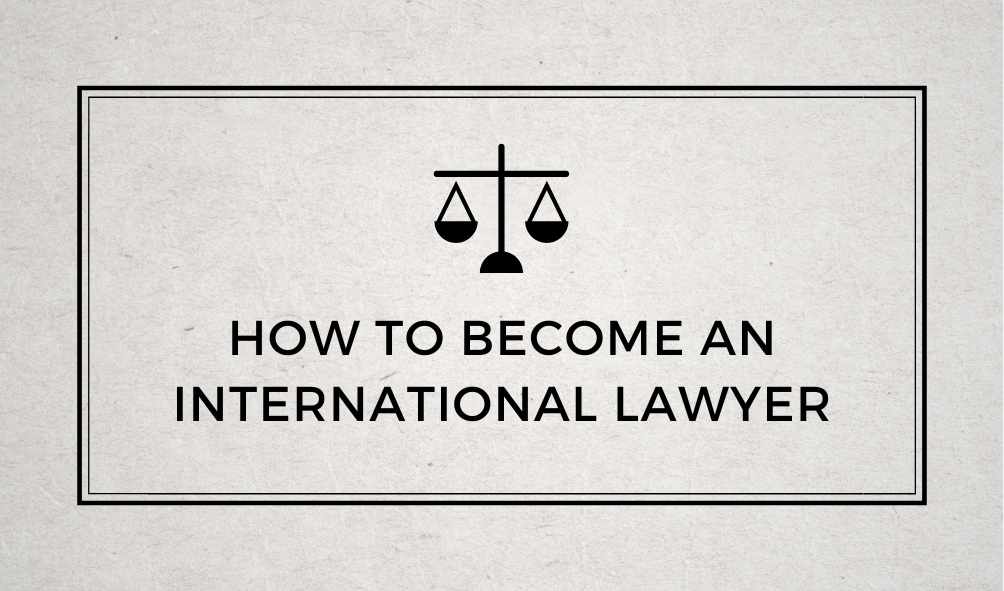How to Become an International Lawyer?

To become an international lawyer, one must obtain a law degree and gain expertise in international law. Continuous education and networking are essential to succeed in this field.
How to Become an International Lawyer? Embarking on a career as an international lawyer involves a robust educational foundation and a dedication to understanding the diverse legal systems and cultures that influence international law. Studying relevant subjects such as international relations, foreign languages, and international trade can provide valuable insights.
Developing fluency in multiple languages greatly enhances one’s ability to work across different jurisdictions and connect with a global clientele. Aspiring international lawyers typically intern with law firms or international organizations to gain practical experience. Securing a position in this competitive field requires not only a strong academic record but also a keen ability to adapt and innovate in an ever-evolving legal landscape. Thus, an international lawyer must be well-versed in cross-border legal implications and adept at navigating the complex interfaces between different legal systems.

Credit: slideplayer.com
The International Lawyer’s Landscape
The realm of international law is vast and dynamic. This field offers the opportunity to work on global issues. Lawyers in this domain address diverse legal systems and cultures. They often travel and experience different legal landscapes. This career path is not only prestigious but also intellectually rewarding.
International lawyers navigate through complex legal territories. They must be adept in areas such as human rights, trade laws, and environmental regulations. Their work involves interacting with a variety of legal entities and organizations across borders.
Career Prospects In International Law
The career trajectory for international lawyers is promising. Opportunities are available in private law firms, international organizations, and non-governmental organizations (NGOs). Many international lawyers also find roles in government agencies and multinational corporations.
- Private Practice: Advising clients on cross-border transactions and disputes.
- International Organizations: Working for entities like the UN or the World Bank.
- Non-Governmental Organizations: Advocating for human rights, environmental causes, or development.
- Government and Public Sector: Crafting policies or representing state interests in international matters.
Key Skills For Success
Success as an international lawyer hinges on certain key skills. Mastery of multiple languages is a tremendous asset. Strong analytical and research skills are imperative. Effective communication and the ability to navigate different cultures are essential. Attention to detail and perseverance also play critical roles.
| Skill Category | Examples |
|---|---|
| Language Proficiency | Fluency in multiple languages. |
| Analytical Skills | Ability to interpret complex texts and treaties. |
| Research Proficiency | Expertise in conducting thorough legal research. |
| Communication Skills | Clear articulation of ideas and arguments. |
| Cultural Competency | Sensitivity and understanding of diverse cultures. |
| Detail Orientation | Meticulous attention to legal details. |
| Perseverance | Commitment to achieving objectives despite challenges. |
“`
The above HTML content is designed to be easily incorporated into a WordPress blog, offering a clear insight into the exciting world of international law. It elucidates the diverse job prospects and essential skills needed for success in this field, formatted in an SEO-optimized way that is easy to read and understand.
Education Requirements
Becoming an international lawyer is an exciting journey. It starts with the right education. You need a strong legal background. You also need to understand global laws and cultures. The steps below will guide you.
Undergraduate Pathways
To kickstart your career, focus on an undergraduate degree. Any major can lead to law school, but some are better. Think about political science, international relations, or foreign languages. These majors build the foundation you need.
- Political Science: Understand government systems.
- International Relations: Learn about global politics.
- Foreign Languages: Communicate across cultures.
Law School Curriculum And Specializations
Law school is your next step. In law school, you will study various subjects. In your first year, expect general legal principles. Later, you can choose specializations. These may include international business law or human rights law.
| Year | Focus |
|---|---|
| First | General Principles |
| Latter Years | Specializations |
Importance Of International Law Certifications
Add international law certifications to stand out. These certifications show your expertise. They tell employers you are serious about international law. Look into the International Law Certificate. Others include human rights and environmental law certificates. Aim for these achievements:
- Learning: Deepen your law knowledge.
- Networking: Connect with global experts.
- Recognition: Gain respect in the law community.
Mastering Multiple Jurisdictions
Embarking on the journey to become an international lawyer is as thrilling as it is challenging. Success in this field demands not only a deep understanding of law, but also the ability to navigate multiple legal systems. This mastery sets the foundation for a dynamic career that crosses borders and cultures.
Understanding Different Legal Systems
International lawyers face a complex world of diverse legal traditions. Common law, civil law, religious law, and customary law are major categories each lawyer must grasp. Your expertise determines the weight of your global footprint. A true international lawyer knows how laws operate in different contexts.
- Common Law: Emphasizes case law and judicial precedent
- Civil Law: Focuses on codified statutes and principles
- Religious Law: Derives from religious texts and practices
- Customary Law: Relies on local customs and tradition
Fluency In Foreign Languages
Speaking various languages bridges the gap between diverse legal environments. High demand exists for multilingual lawyers. Your language skills can be a game-changer. They allow you to work seamlessly with international clients and legal documents.
| Language | Benefits |
|---|---|
| English | Access to a vast body of common law resources |
| French | Insight into civil law and many international institutions |
| Spanish | Communication with clients across many countries |
| Mandarin | Entry into one of the largest legal markets |

Credit: www.interlegal.net
Professional Experience And Networking
Embarking on a career as an international lawyer is both stimulating and challenging. Key to this path is gaining the right kind of professional experience and expanding your network. Strong connections and hands-on learning provide the pillars upon which a successful global legal career is built.
Securing International Internships
International internships are golden opportunities to immerse yourself in global legal practices.
- Research law firms with a strong international presence
- Contact universities offering study abroad and exchange programs
- Apply early and tailor your resume to global legal standards
These internships can greatly boost your exposure to different legal systems and cultures, a must for any aspiring international lawyer.
Leveraging Legal Networks And Associations
Joining and actively participating in legal networks can leverage your career to new heights.
| Organization | Benefits |
|---|---|
| International Bar Association (IBA) | Global networking, resources, conferences |
| American Society of International Law (ASIL) | Research tools, professional development |
| Local Bar Associations | Local opportunities, community engagement |
- Attend international legal conferences for networking
- Participate in webinars to keep up with global trends
- Volunteer for committees within these organizations
Remember, the connections you make can lead to potential mentorships, partnerships, and job offers.
Building A Global Career
Embarking on a career in international law isn’t just about understanding legal statutes; it involves building a career that crosses borders and cultures. A global career in law can catapult a professional into a world of exciting challenges, diverse clients, and unique legal landscapes. Let’s explore how to prepare for and succeed in the international legal market.
Choosing The Right Legal Market
Success in international law starts with choosing a legal market that aligns with your interests and skills. Research to identify where your legal expertise is in demand and what regions align with your career goals. Consider factors like language skills, legal systems, and economic stability. The key is to find a niche where you can provide value and grow professionally.
Continuing Education And Cross-border Collaboration
Continuous learning keeps international lawyers competitive. Stay abreast of global legal trends through advanced degrees or certifications. Collaborating with peers across borders offers insights into different legal systems. Join international law societies and attend global conferences to expand your network.
Challenges And Ethical Considerations
Global lawyering comes with obstacles. From navigating cultural nuances to adhering to varying legal ethics, being proficient in your practice is crucial. Ethical considerations like client confidentiality and conflict of interest differ globally. Strive to uphold the highest professional standards while being culturally sensitive.

Credit: www.wikihow.com
Conclusion
Embarking on an international law career is both challenging and rewarding. Master language skills, gain multicultural understanding, and secure relevant qualifications. Your journey begins with a single step toward global legal expertise. Embrace the adventure and make your mark on the world stage.
Dream big and start now.
Introducing Jonah Plum, a legal luminary whose journey through the corridors of justice has been intertwined with the eloquence of the written word. Born and raised in the vibrant city of Seattle, Washington, Jonah's early fascination with language and debate laid the foundation for a remarkable career in law.
Jonah's scholarly odyssey began at Harvard Law School, where they immersed themselves in the study of jurisprudence, honing their analytical prowess and legal acumen. Armed with a law degree, they entered the legal arena, navigating courtrooms and boardrooms with a fervor for justice. Yet, it was the realization of the transformative power of the written word that led Jonah to pivot from legal briefs to the world of blogging.
A digital advocate in the truest sense, Jonah recognized the need for demystifying legal concepts and making them accessible to a broader audience. This blog, a virtual repository of legal insights, transcends geographical boundaries, connecting with a global readership hungry for clarity amidst legal complexities.
Beyond the black letter of the law, Jonah delves into the human stories that underscore the legal landscape. Their writing goes beyond legal analysis, weaving narratives that humanize the law, shedding light on its impact on individuals and society.






